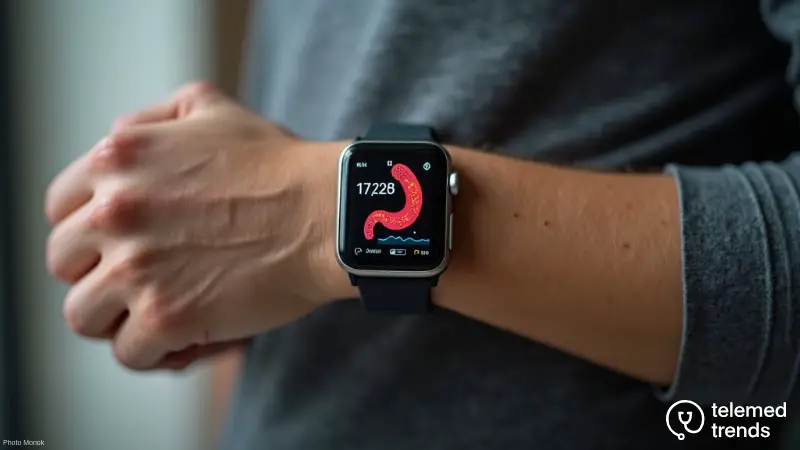A new study from Mount Sinai has found that wearable devices can predict flare-ups in people with inflammatory bowel disease (IBD) up to seven weeks before symptoms start. This breakthrough could change how doctors manage the condition, offering a way to detect inflammation early and take action before symptoms worsen.
IBD includes conditions like Crohn’s disease and ulcerative colitis, which affect millions of people. Flare-ups can cause pain, diarrhea, fatigue, and other serious issues. Currently, doctors rely on tests and patient reports to track the disease, but these methods don’t always catch flare-ups in time. This study shows that wearable technology may offer a better solution.
Key Takeaways
Wearable devices can predict inflammatory bowel disease flare-ups up to seven weeks before symptoms appear, potentially revolutionizing how the condition is managed.
- Wearable technology tracks heart rate variability, sleep patterns, and physical activity to detect early signs of inflammation.
- Early detection allows for proactive treatment adjustments by doctors, reducing severe flare-ups and hospital visits.
- The study suggests that wearable devices could be used to manage other chronic diseases as well.
How wearable devices help monitor IBD
The study included over 300 people with IBD from 36 different states. Each participant wore a fitness tracker, such as an Apple Watch, Fitbit, or Oura Ring. These devices collected data on their heart rate, oxygen levels, movement, and sleep patterns. Participants also filled out daily surveys about their symptoms and provided blood and stool samples to measure inflammation levels.
Researchers discovered that certain signs in the body changed before a flare-up happened. For example, heart rate variability—how much time passes between heartbeats—was different when inflammation was increasing. Other signs, like changes in sleep and physical activity, also pointed to flare-ups before patients felt symptoms.
This means that wearable devices can track inflammation in real-time, giving doctors a chance to act before a flare-up becomes severe. Instead of waiting for symptoms to appear, doctors could adjust treatment based on early warning signs, reducing the need for emergency care or invasive procedures.
What this means for patients and doctors
The ability to predict flare-ups early is a big step forward for people with IBD. Flare-ups can be unpredictable and difficult to manage, often leading to hospital visits or changes in medication. With wearables, doctors can monitor patients remotely and respond faster when a flare-up is likely to happen.
For patients, this technology offers a more convenient way to track their health. Instead of relying on frequent doctor visits or invasive tests, they can use a simple device that collects health data throughout the day. This could lead to better treatment and a higher quality of life.
Doctors also benefit because they can use wearable data to personalize treatment. If a device shows signs of inflammation, a doctor could adjust a patient’s medication or recommend lifestyle changes before symptoms get worse. This proactive approach could prevent complications and help keep IBD under control.
The future of wearable technology in healthcare
The success of this study suggests that wearable technology could be used to manage other chronic diseases, such as rheumatoid arthritis and asthma. Researchers believe that artificial intelligence could be used to create personalized algorithms, which would predict flare-ups based on each person’s unique data.
As wearable devices become more advanced, they can track even more health signals, such as blood sugar levels, stress, and hydration. Doctors could then use this information to provide better care for a wide range of conditions.
In addition, wearable data could be linked with electronic health records, allowing doctors to see a complete picture of a patient’s health over time. This would make it easier to track disease progression and adjust treatment plans accordingly.
The study, published in Gastroenterology, highlights how wearable technology can improve healthcare by making it more proactive and personalized. As more people start using these devices, they could become a regular part of managing chronic conditions.
A step toward better disease management
Inflammatory bowel disease can be difficult to live with, but wearable technology offers new hope for patients and doctors. By detecting flare-ups early, these devices allow for faster treatment and better disease management. Instead of waiting for the the symptoms to appear, patients can take action before a flare-up happens, leading to better outcomes and fewer hospital visits.
The findings from Mount Sinai show that technology has the potential to transform healthcare, making it more accessible and efficient. As wearable devices continue to improve, they could become a key tool in managing not just IBD, but many other chronic diseases as well.
For now, this study marks an important step in using technology to help people with IBD live healthier, more comfortable lives.
Challenges and considerations for widespread use
While wearable devices offer a promising way to predict and manage inflammatory bowel disease, there are still challenges to consider before they become a standard part of care.
One major concern is accuracy—although the study showed that wearables can detect early signs of inflammation, they are not a perfect replacement for traditional tests like bloodwork and colonoscopies. Doctors will need to determine how best to combine wearable data with existing medical evaluations to ensure accurate diagnosis and treatment.
Data privacy is another key issue. Wearable devices collect continuous health information, which raises concerns about how that data is stored and shared. Ensuring that patient data remains secure and confidential is crucial to gaining trust in this technology.
Despite these challenges, the potential benefits of wearables for IBD patients are significant. As more research is conducted and the technology continues to improve, wearable devices could become an essential tool in chronic disease management, offering early warnings and better outcomes for millions of people worldwide.






